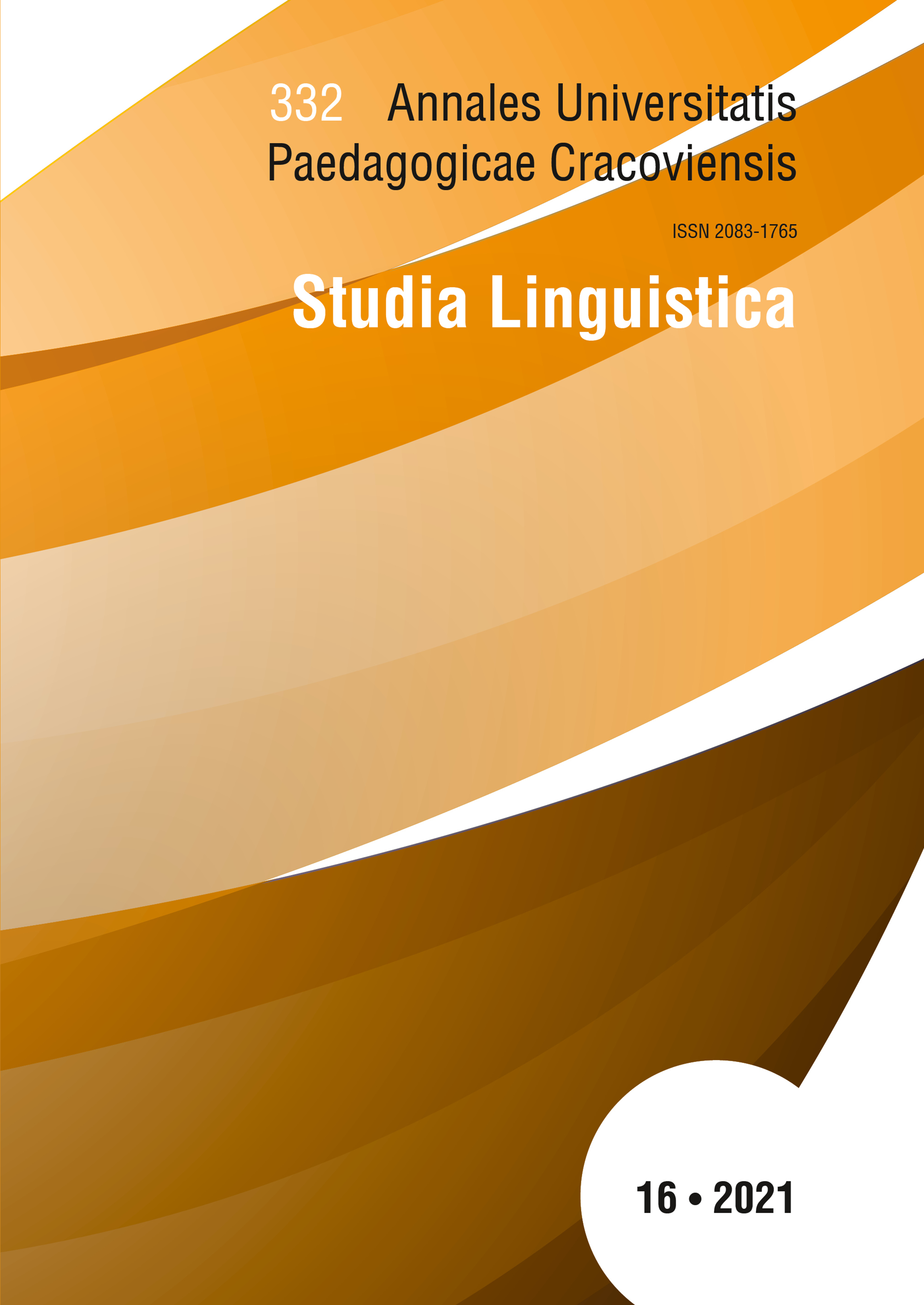From recording to corpus, i.e. the method of archiving of the rural speech with using digital linguistics tools
Main Article Content
Abstract
The article presents the method of archiving of the rural speech during the development of the electronic language corpus. Attention is focused on how to get spoken data and transcription of non-standard dialect code. It also presents the problems and limitations resulting from nonnormative spoken data and the solutions applied. The recording and converting of spoken language data for corpus is a complex and multi-phase process. The data is obtained from recorded interviews with respondents. The developed system of spoken data transcription combines the properties of non-standard code, the capabilities of tools and needs of corpus.
Downloads
Article Details

This work is licensed under a Creative Commons Attribution-NonCommercial-NoDerivatives 4.0 International License.
Author, submitting a text to the editorial board of the journal “Annales Universitatis Paedagogicae Cracoviensis. Studia Linguistica", certifies that the content of the article has not been published so far and that the work does not violate in any way the copyright or related rights of other person, as well as other rights of third parties, and that no one's rights to the work (or any part thereof) have been missed. After signing the contract, the property rights to the published materials are transferred to the Scientific Publisher of the University of the National Education Commission, Krakow.
“Annales Universitatis Paedagogicae Cracoviensis. Studia Linguistica” is an open access journal, and all its content is made available free of charge to users and institutions under the Creative Commons CC-BY-NC-ND 4.0 license (attribution, non-commercial use, no derivative works). Under this license, the authors agree that their work may be lawfully reused for any purpose, except for commercial purposes, without the prior consent of the author or publisher. Everyone can read, download, copy, print, distribute and process these works, provided that the author's marking and the original publication place are correct. Published texts may not be used to create derivative works (e.g. to translate and publish in another language without the consent of the publisher). This is in line with the BOAI (Budapest Open Access Initiative) definition. "Studia Linguistica" does not charge for submitting or processing articles.
References
Bańko M., Kłosińska A., 1994, Polszczyzna mówiona nieobecna w słownikach, [w:] Współczesna polszczyzna mówiona w odmianie opracowanej (oficjalnej), red. Z. Kurzowa, W. Śliwiński, Kraków, s. 89–96.
Google Scholar
Dunaj B., 1986, Dialektologia a socjolingwistyka, „Folia Linguistica” 12, s. 15–23.
Google Scholar
Grochola-Szczepanek H., Górski R.L., von Waldenfels R., Woźniak M., 2019, Korpus języka mówionego mieszkańców Spisza, „LingVaria” LV/1, s. 165–180.
Google Scholar
Grochola-Szczepanek H., Woźniak M., 2018a, Badania korpusowe języka mieszkańców Spisza a czynnik pokoleniowy, [w:] Dialog pokoleń w języku i językoznawstwie, red. E. Wierzbicka-Piotrowska, Warszawa, s. 79–90.
Google Scholar
Grochola-Szczepanek H., Woźniak M., 2018b, Transkrypcja języka mieszkańców wsi w aplikacji ELAN w Korpusie Spiskim, [w:] Historia języka, dialektologia i onomastyka w nowych kontekstach interpretacyjnych, red. R. Przybylska, M. Rak, A. Kwaśnicka-Janowicz, Kraków, s. 267–278.
Google Scholar
Klessa K., Wagner A., Oleśkowicz‑Popiel M., Karpiński M., 2013, Paralingua – A New Speech Corpus for the Studies of Paralinguistic Features, „Procedia‑Social and Behavioral Sciences” 95, s. 48–58.
Google Scholar
Labocha J., 2012, Pragmatyczne mechanizmy składni języka mówionego, „Slavia Occidentalis” 69, s. 139–145.
Google Scholar
Lewaszkiewicz T., 2017, O zapisach fonetycznych polskiej i słowiańskiej mowy ludowej i potocznej, „Gwary Dziś” 9, s. 183–197.
Google Scholar
Przybylska R., 2009, Badania nad polszczyzną mówioną a leksykografia, [w:] Polszczyzna mówiona ogólna i regionalna, red. B. Dunaj, M. Rak, Kraków, s. 33–39.
Google Scholar
Sierociuk J., 2009, Zasoby fonograficzne Zakładu Dialektologii Polskiej Uniwersytetu im. Adama Mickiewicza i ich przydatność w badaniach procesów rozwojowych polszczyzny mówionej, [w:] Polszczyzna mówiona ogólna i regionalna, red. B. Dunaj, M. Rak, Kraków, s. 179–188.
Google Scholar
Wagner A., Bachan J., Klessa K., Demenko G., 2015, Przegląd wybranych aspektów analizy prozodii mowy spontanicznej na potrzeby technologii mowy, „Prace Filologiczne” LXVI, s. 271–298.
Google Scholar
Waldenfels R. von, Woźniak M., 2016, SpoCo – a simple and adaptable web interface for dialect corpora, „Journal for Language Technology and Computational Linguistics” 31, s. 155–170.
Google Scholar
Baza Mazak, Akustyczna baza danych gwar mazowieckich. Wokalizm, http://www.bazamazak.uw.edu.pl/ (dostęp: 07.02.2021).
Google Scholar
Český národní korpus, http://ucnk.ff.cuni.cz (dostęp: 07.02.2021).
Google Scholar
GOS – Referenčni govorni korpus slovenskega jezika, http://korpus-gos.net (dostęp: 07.02.2021).
Google Scholar
Korpus Spiski, Język mieszkańców Spisza. Korpus tekstów i nagrań gwarowych, http://spisz.ijp.pan.pl (dostęp: 07.02.2021).
Google Scholar
NKJP – Narodowy Korpus Języka Polskiego, http://nkjp.pl (dostęp: 07.02.2021).
Google Scholar
Pęzik P., 2012, Język mówiony w NKJP, [w:] Narodowy Korpus Języka Polskiego, red. A. Przepiórkowski, M. Bańko, R. Górski, B. Lewandowska‑Tomaszczyk, Warszawa, s. 37–47, http://nkjp.pl/index.php?page=3&lang=0 (dostęp: 27.02.2021).
Google Scholar
Pęzik P., 2014, Spokes – a search and exploration service for conversational corpus data, https://clarin-pl.eu/dspace/bitstream/handle/11321/47/spokes_pezik.pdf?sequence=5&isAllowed=y (dostęp: 10.01.2021).
Google Scholar
Przepiórkowski A., Bańko M., Górski R.L., Lewandowska-Tomaszczyk B. (red.), 2012, Narodowy Korpus Języka Polskiego, Warszawa, http://nkjp.pl/index.php?page=3&lang=0 (dostęp: 27.02.2021).
Google Scholar
Spokes-CLARIN, http://spokes.clarin-pl.eu/ (dostęp: 07.02.2021).
Google Scholar
